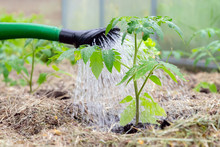Boost Garden Water Conservation with Mulch, A Comprehensive Guide

Boost Garden Water Conservation with Mulch: A Comprehensive Guide
Mulch is a gardener's best friend when it comes to water conservation. Let's dive into the world of Mulching for Water Conservation and how it can transform your garden.
Understanding Mulch Benefits
Mulch is a layer of material applied to the surface of soil. It acts like a blanket, keeping the soil cool and moist. But did you know that mulch can also help reduce water evaporation by up to 50%? That's a significant saving in your water bill and the environment's resources.
Water-Saving Gardening with Mulch
Mulch creates a barrier between the soil and the sun, reducing the rate of evaporation. This means you can water your plants less frequently, saving water and time. Plus, mulch helps prevent soil erosion and compaction, improving your garden's overall health.
Choosing the Right Mulch: Organic vs. Inorganic
When it comes to Garden Water Management, organic mulch is your best bet. Materials like wood chips, straw, and leaves not only conserve water but also improve soil fertility as they decompose. Inorganic mulches like gravel and plastic can also conserve water but lack the nutritional benefits of organic mulch.
Applying Mulch for Water Conservation
For optimal water conservation, apply a 2-4 inch layer of mulch around your plants, ensuring it doesn't touch the stems. This creates a microclimate that retains moisture and regulates soil temperature.
Mulch and Drought Resistance
Mulch can also help your plants become more drought-resistant. By reducing evaporation, mulch allows the soil to retain more water, giving your plants a reserve to draw from during dry spells.
Mulch and Weed Control
Another benefit of mulch is its ability to suppress weeds. Weeds compete with your plants for water and nutrients, so keeping them at bay can further improve your garden's water efficiency.
Mulch and Water Runoff
Mulch can also help manage water runoff during heavy rains. It slows down the water, allowing it to seep into the soil rather than running off and potentially causing erosion.
Mulch Myths Debunked
There's a common myth that mulch can lead to overwatering. However, as explained in this article from Garden Myths, when applied correctly, mulch actually helps prevent overwatering by improving the soil's water-holding capacity.
Mulch Maintenance for Optimal Water Conservation
To keep your mulch effective, replenish it annually. Over time, it will break down and need to be replenished to maintain its water-saving benefits.
Conclusion
Using mulch to conserve water in your garden is a simple, effective, and environmentally friendly strategy. By reducing evaporation, improving soil health, and suppressing weeds, mulch can help you create a beautiful, water-efficient garden.
FAQs
-
How much mulch should I apply for water conservation?
- A 2-4 inch layer of mulch is recommended for optimal water conservation.
-
Can mulch prevent overwatering?
- Yes, by improving the soil's water-holding capacity, mulch can help prevent overwatering.
-
Is organic mulch better for water conservation than inorganic mulch?
- Organic mulch offers both water conservation and soil fertility benefits, making it a better choice for water conservation.
-
How often should I replace my mulch?
- Mulch should be replenished annually to maintain its water-saving benefits.
-
Can mulch help my plants survive droughts?
- Yes, by reducing evaporation and improving the soil's water-holding capacity, mulch can help your plants become more drought-resistant.
0 Response to " Boost Garden Water Conservation with Mulch, A Comprehensive Guide"
Post a Comment